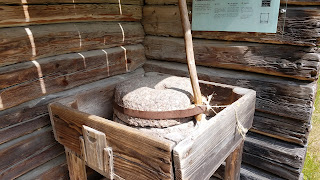Episode 20 Wheat & Barley – Missing Real Bread & Beer
Listen to "020 Wheat & Barley - Missing Real Bread & Beer" on Spreaker.
to Barley:
(2 row preferred for beer, 6 row usually eaten as a grain - functionally interchangeable, but some flavor/sugar/fermentation differences)
The difference comes in the germination temps, length of growing season, nutrient requirements, and then the all important gluten - does the ground flour - when wet stick together and stretch - so it can form bubbles during baking, or crumble and need to be a flatbread.
Link to the Episode:
Episode 20 Wheat & Barley – Missing Real Bread & Beer
It's all grass!
Compare to Teosinte (corn before it was corn):
to Barley:
(2 row preferred for beer, 6 row usually eaten as a grain - functionally interchangeable, but some flavor/sugar/fermentation differences)
 |
By Xianmin Chang - Own work by Xianmin.Chang@orkney.uhi.ac.uk;
changxianmin2002@yahoo.co.uk,
Public Domain, https://commons.wikimedia.org/w/index.php?curid=5512681
& Wheat:
 |
| Photo Credit: Mark Nesbitt - Own work, CC BY-SA 4.0, https://commons.wikimedia.org/w/index.php?curid=49399350 |
The difference comes in the germination temps, length of growing season, nutrient requirements, and then the all important gluten - does the ground flour - when wet stick together and stretch - so it can form bubbles during baking, or crumble and need to be a flatbread.
Quern Stones:
On a table to catch the ground meal (the early colonists would likely have had a stick in a hole chipped into the stone instead of a iron band)
Another typical way to use a quern at this time - 2 handed:





Comments
Post a Comment